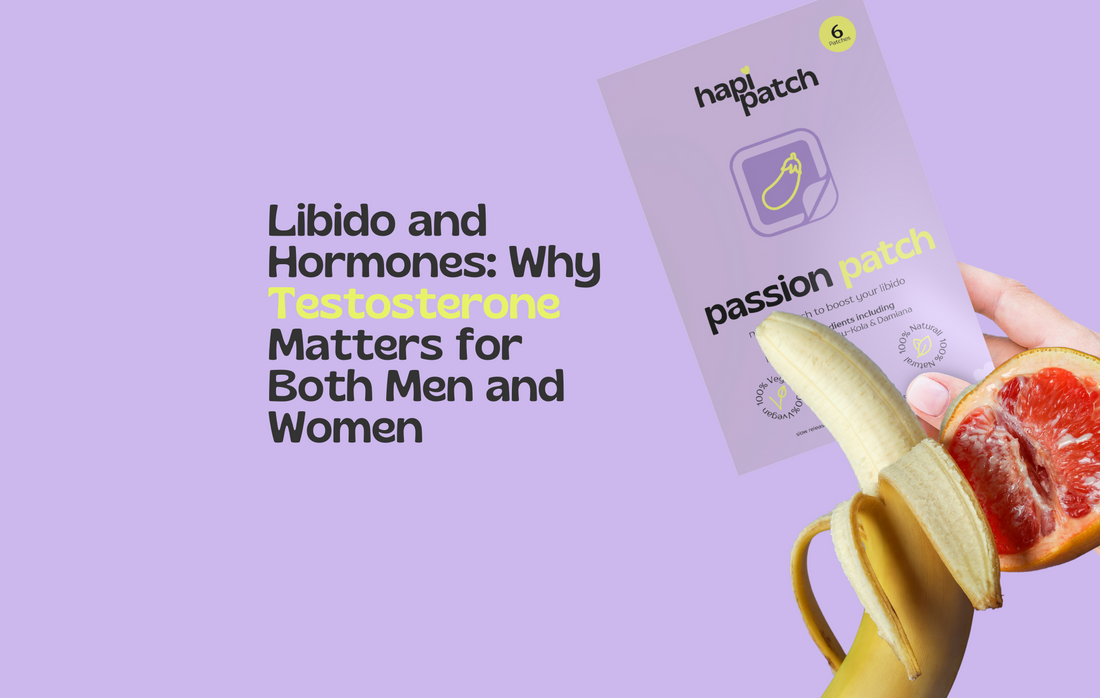When people think of testosterone, it’s often considered a "male" hormone, responsible for muscle growth, facial hair, and overall masculinity. But testosterone is just as important for women, particularly when it comes to libido, energy, and mood. For both men and women, testosterone plays a crucial role in maintaining sexual desire, and its decline can significantly impact your sex life, especially as you age.
In this blog, we’ll dive into how testosterone affects libido in both men and women, why testosterone levels decline with age, and how natural solutions like The Passion Patch can support healthy testosterone production and help restore sexual vitality.
The Role of Testosterone in Libido
Testosterone is produced in the testes for men and the ovaries and adrenal glands for women. Although women produce much lower levels of testosterone than men, the hormone plays an equally important role in sexual desire, energy, and overall well-being. In both genders, testosterone helps regulate:
- Libido: Testosterone boosts sexual desire and arousal in both men and women. It supports sexual response, sensitivity, and the ability to experience pleasure.
- Energy Levels: Testosterone contributes to physical stamina and energy. When levels are optimal, it supports motivation and the drive to engage in physical activity, including sex.
- Mood: Testosterone has a direct influence on mood regulation. Low testosterone levels can lead to irritability, depression, or general apathy, which can further reduce libido.
How Testosterone Affects Libido in Men
In men, testosterone is the primary hormone responsible for sexual desire and performance. Testosterone levels in men peak during adolescence and early adulthood, but they begin to gradually decline after the age of 30. This natural decline—about 1% per year—can lead to a variety of symptoms, including:
- Reduced libido: Men with low testosterone often experience a decrease in sexual desire and interest in sex.
- Difficulty achieving erections: Testosterone plays a key role in achieving and maintaining erections. Low levels can make it harder to achieve spontaneous erections or maintain them during sexual activity.
- Fatigue and low energy: Testosterone also influences energy levels and physical stamina. Men with low testosterone may feel more tired and less motivated to engage in physical activity, including sex.
- Mood changes: Low testosterone levels can contribute to feelings of depression, anxiety, or irritability, further dampening sexual interest.
How Testosterone Affects Libido in Women
Although women have lower levels of testosterone than men, it is equally important for female sexual health. Testosterone in women supports sexual desire, energy, and overall well-being. It also plays a role in maintaining vaginal health and sensitivity, making it easier to experience pleasure.
During perimenopause and menopause, women experience a significant drop in testosterone levels. This decline can lead to:
- Decreased libido: Many women notice a drop in sexual desire during menopause, largely due to declining testosterone levels. They may feel less interested in sex or have difficulty becoming aroused.
- Vaginal dryness: Testosterone helps maintain vaginal health by supporting lubrication. Low levels can lead to vaginal dryness, making intercourse uncomfortable or painful.
- Fatigue and low energy: Like men, women with low testosterone may feel fatigued and less motivated to engage in physical activity, including sex.
- Mood changes: Women with low testosterone may experience mood swings, irritability, or even depression, which can contribute to a reduced interest in intimacy.
The Science Behind Testosterone Decline
Both men and women experience a natural decline in testosterone levels as they age. For men, testosterone levels start to decrease around age 30, while women typically experience a more pronounced decline during perimenopause and menopause. This decline in testosterone is a natural part of aging, but certain factors can accelerate the process, including:
- Chronic stress: Stress increases cortisol levels, which can suppress testosterone production.
- Poor diet: Diets low in essential nutrients like zinc, magnesium, and omega-3 fatty acids can hinder testosterone production.
- Lack of exercise: Physical inactivity can contribute to lower testosterone levels. Regular exercise helps boost testosterone in both men and women.
- Sleep deprivation: Sleep is essential for hormone regulation, including testosterone production. Poor sleep can lead to lower testosterone levels.
Symptoms of Low Testosterone
Whether you’re male or female, low testosterone can cause several noticeable symptoms that affect sexual health and overall well-being. Common symptoms of low testosterone include:
- Decreased libido
- Fatigue or low energy
- Mood swings or irritability
- Difficulty achieving or maintaining erections (in men)
- Vaginal dryness or discomfort during sex (in women)
- Reduced stamina or physical endurance
Natural Ways to Boost Testosterone and Improve Libido
There are several natural ways to support healthy testosterone levels and boost libido for both men and women. By incorporating these strategies into your daily routine, you can help restore hormonal balance and improve your sexual health.
- Exercise Regularly
Exercise is one of the most effective ways to naturally boost testosterone levels. Strength training, in particular, can help stimulate the production of testosterone in both men and women. Cardiovascular exercise also improves circulation, which is essential for sexual health and energy levels.
- Eat a Hormone-Supportive Diet
Your diet plays a significant role in hormone production, including testosterone. To support healthy testosterone levels, focus on eating foods rich in zinc, magnesium, and healthy fats:
- Zinc: Foods like pumpkin seeds, oysters, and chickpeas are high in zinc, which is essential for testosterone production.
- Magnesium: Found in leafy greens, nuts, and seeds, magnesium supports hormonal balance and energy levels.
- Omega-3 fatty acids: Foods like salmon, flaxseeds, and walnuts help support overall hormone health.
- Manage Stress
Chronic stress increases cortisol levels, which can suppress testosterone production. Practising stress-relief techniques like meditation, yoga, or deep breathing can help lower cortisol levels and support healthy testosterone levels.
- Prioritise Sleep
Quality sleep is crucial for maintaining hormone balance, including testosterone production. Aim for 7-9 hours of restful sleep each night to support optimal testosterone levels. Good sleep hygiene—such as creating a calming bedtime routine and limiting screen time before bed—can improve sleep quality.
How The Passion Patch Supports Testosterone and Libido
The Passion Patch is a transdermal patch designed to support natural testosterone production and enhance libido in both men and women. It uses a blend of natural ingredients known for their libido-boosting and hormone-balancing properties. The patch is designed to deliver these active ingredients directly through the skin and into the bloodstream, ensuring faster and more consistent absorption than oral supplements.
Key Ingredients in The Passion Patch:
- Tribulus Terrestris: A well-known herb that supports testosterone production, Tribulus Terrestris helps increase libido in both men and women by promoting healthy hormone levels.
- L-Arginine: L-Arginine boosts nitric oxide levels in the body, improving blood flow and supporting physical arousal. Better circulation leads to enhanced sensitivity and sexual pleasure.
- Ginseng Extract: Ginseng is an adaptogenic herb that helps reduce stress and fatigue while boosting overall energy levels, making it easier to engage in intimacy.
By using transdermal technology, The Passion Patch ensures that these ingredients are absorbed directly into the bloodstream for maximum effectiveness. The patch’s 4-layered matrix design allows for a steady release of ingredients over 24 hours, providing continuous support for libido and hormone balance throughout the day.
Why Transdermal Delivery Is Effective for Testosterone Support
Transdermal patches, like The Passion Patch, are designed to deliver active ingredients through the skin, bypassing the digestive system. This allows for faster absorption and ensures that the nutrients are absorbed directly into the bloodstream, maintaining their potency and effectiveness. The gradual release of ingredients from the patch helps maintain consistent hormone support throughout the day, preventing the spikes and crashes often associated with oral supplements.
FAQ: Testosterone and Libido for Men and Women
- Can low testosterone affect libido in both men and women?
Yes, testosterone plays a crucial role in libido for both men and women. Low testosterone levels can lead to a decrease in sexual desire, energy, and mood.
- How can I naturally boost my testosterone levels?
Regular exercise, a hormone-supportive diet, stress management, and quality sleep are all natural ways to support healthy testosterone levels.
- Can The Passion Patch help improve testosterone levels?
Yes, The Passion Patch contains natural ingredients like Tribulus Terrestris and L-Arginine, which support healthy testosterone production and improve libido for both men and women.
- At what age do testosterone levels start to decline?
In men, testosterone levels begin to decline around age 30, while in women, testosterone levels typically decrease during perimenopause, which can start in their 40s or 50s.
- What are the symptoms of low testosterone?
Common symptoms of low testosterone include decreased libido, fatigue, mood swings, difficulty achieving erections (in men), and vaginal dryness or discomfort during sex (in women).

